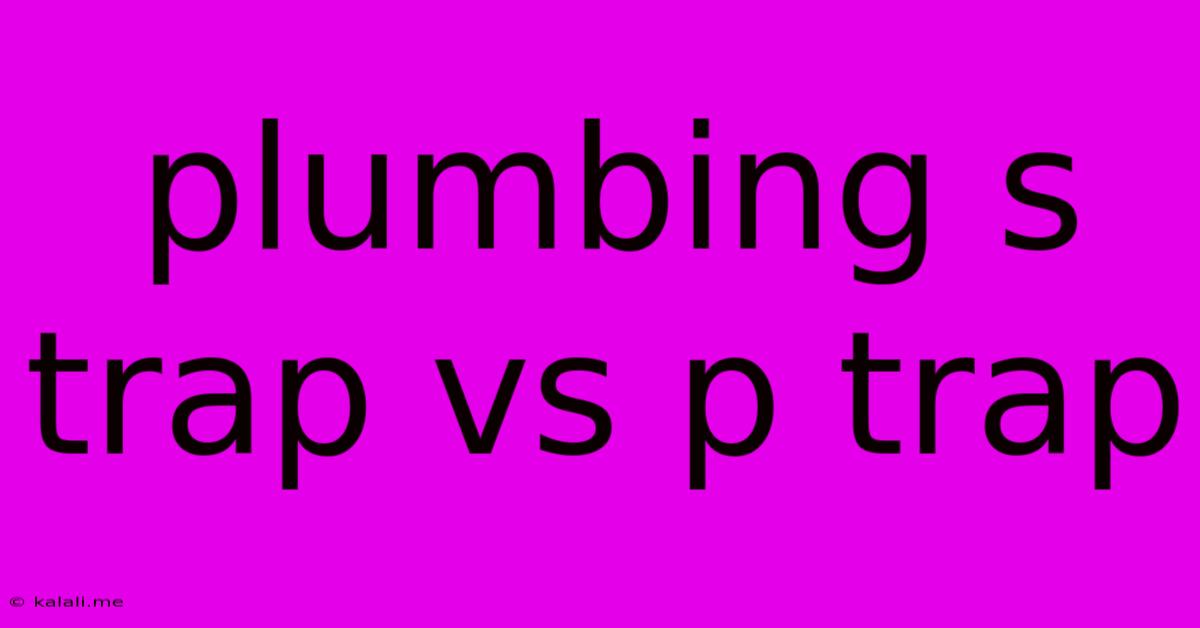Plumbing S Trap Vs P Trap
Kalali
May 22, 2025 · 3 min read

Table of Contents
P-Trap vs. S-Trap: Which is Best for Your Plumbing?
Choosing the right plumbing trap might seem like a minor detail, but it's crucial for maintaining a healthy and functional drainage system. This article will delve into the differences between P-traps and S-traps, helping you understand their functionalities, advantages, and disadvantages to make an informed decision for your home plumbing. We'll cover installation, maintenance, and ultimately help you determine which trap is the better choice for your specific needs.
Understanding the Purpose of Plumbing Traps
Before diving into the specifics of P-traps and S-traps, let's understand their fundamental purpose. Plumbing traps are essential components of any drainage system. Their primary function is to prevent sewer gases – which contain harmful bacteria and unpleasant odors – from entering your home through drains. They achieve this by holding a small amount of water, creating a seal that blocks the passage of gases.
The P-Trap: A Popular Choice
The P-trap, named for its characteristic P-shape, is the most common type of plumbing trap found in residential homes. Its design is simple and effective. The bend in the pipe holds water, forming the crucial seal against sewer gases.
Advantages of P-Traps:
- Effective Sewer Gas Prevention: The design reliably prevents the backflow of sewer gases.
- Easy Installation: Relatively straightforward to install, making it a popular DIY project.
- Widely Available: Easily found at most hardware stores.
- Less Prone to Clogging: The larger diameter pipe minimizes the risk of clogs compared to the S-trap.
Disadvantages of P-Traps:
- Requires More Space: The design occupies more space under the sink or fixture than an S-trap.
- Potential for Siphonage: In some cases, strong water flow can siphon the water out of the trap, compromising its sealing ability. This is mitigated by using a vent pipe.
The S-Trap: An Older, Less Preferred Design
The S-trap, shaped like a backward "S," is an older design that's now largely considered outdated. While it also uses water to create a seal, it's less effective and presents several drawbacks compared to the P-trap.
Advantages of S-Traps:
- Space-Saving Design: Its compact shape requires less space under the fixture.
Disadvantages of S-Traps:
- Poor Sewer Gas Prevention: The design is prone to allowing sewer gases to escape, particularly if the water seal is disturbed or evaporates.
- Higher Risk of Clogging: The smaller diameter pipe is more susceptible to clogs.
- Siphonage Issues: More vulnerable to siphonage than P-traps, further compromising its ability to prevent sewer gas.
- Generally Discouraged: Most plumbing codes prohibit the use of S-traps due to the health hazards.
Choosing Between P-Trap and S-Trap: The Verdict
The choice is clear. The P-trap is the superior option for most plumbing applications. Its effectiveness in preventing sewer gases, ease of installation, and lower risk of clogging make it the preferred choice for homeowners and plumbers alike. While the S-trap offers a space-saving advantage, this benefit is significantly outweighed by its significant drawbacks concerning health and functionality. Therefore, it is strongly advised to opt for a P-trap, ensuring optimal performance and safety of your plumbing system. Always consult local plumbing codes before undertaking any plumbing installations or repairs. Correct installation and regular maintenance are key to preventing plumbing issues.
Latest Posts
Latest Posts
-
After Thawing Chicken How Long Is It Good For
May 22, 2025
-
How Long Does Putty Take To Dry
May 22, 2025
-
How Long To Let Red Wine Breathe
May 22, 2025
-
Cat Keeps Peeing On Carpet In Same Spot
May 22, 2025
-
How Do You Bleed An Old Radiator
May 22, 2025
Related Post
Thank you for visiting our website which covers about Plumbing S Trap Vs P Trap . We hope the information provided has been useful to you. Feel free to contact us if you have any questions or need further assistance. See you next time and don't miss to bookmark.